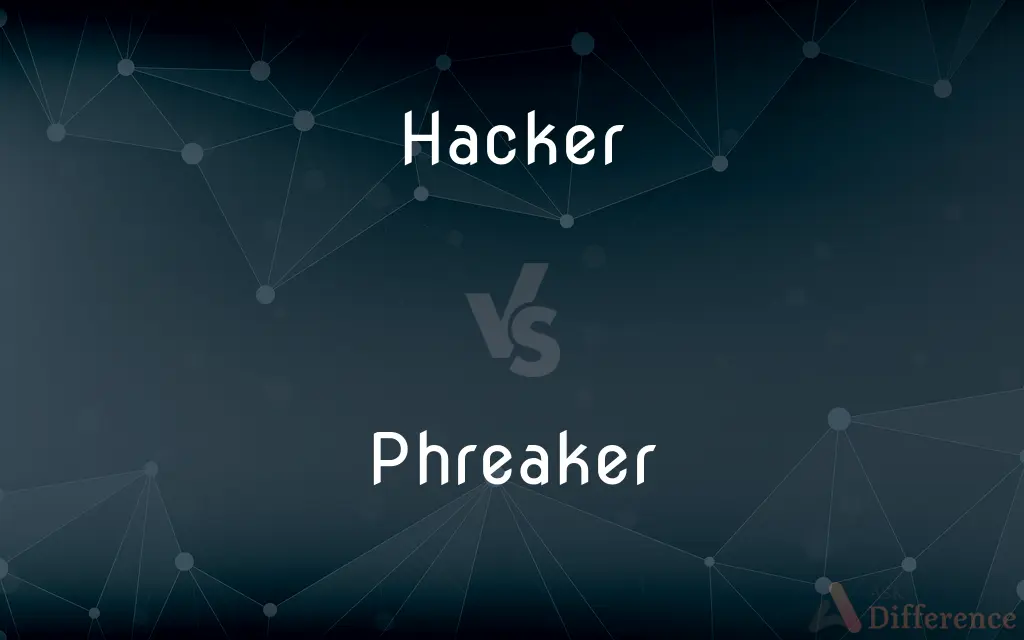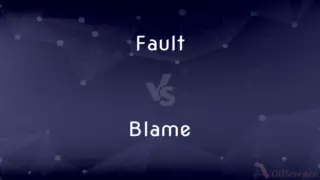Hacker vs. Phreaker — What's the Difference?
By Tayyaba Rehman — Updated on December 25, 2023
A hacker breaks into computer systems, often for unauthorized access or harm, while a phreaker specifically manipulates phone systems, like exploiting free calls.

Difference Between Hacker and Phreaker
Table of Contents
ADVERTISEMENT
Key Differences
A hacker is generally someone who uses their technical expertise to gain unauthorized access to computer systems. This can be for malicious purposes, like stealing data, or as a form of activism. A phreaker, however, specializes in exploiting the telephone system, often to make free calls or disrupt services, using a blend of technical skills and knowledge of telecommunication systems.
Hackers often target computer networks, websites, and digital data. They may be motivated by a range of factors, from financial gain to political activism. Phreakers, on the other hand, are more narrowly focused on telephone networks, using their skills to manipulate phone systems for free calls or to challenge the system itself.
The term "hacker" can have a broad application, sometimes even used positively to describe someone proficient in programming and solving problems with computers. Phreakers, a term derived from 'phone' and 'freak', are specifically associated with the telephone system, and their activities are almost always illegal.
Hackers may use a variety of tools and techniques, such as viruses, malware, or phishing, to breach security systems. Phreakers, in contrast, often use specific techniques related to telecommunication systems, like blue boxes, which were historically used to hack into the phone network.
Both hackers and phreakers require a deep understanding of the systems they are targeting. However, the skills and knowledge base of a phreaker are more specialized in the field of telecommunications, whereas hackers have a broader range of computer systems and networks they might exploit.
ADVERTISEMENT
Comparison Chart
Primary Focus
Gaining unauthorized access to computer systems.
Manipulating telephone systems.
Common Activities
Includes data breaches, creating malware, hacking websites.
Exploiting phone systems for free calls, disrupting services.
Motivation
Can vary from financial gain, activism, to challenge systems.
Often to challenge telecommunication systems or for free services.
Techniques Used
Viruses, malware, phishing, exploiting security vulnerabilities.
Using devices like blue boxes, understanding phone networks.
Knowledge Base
Broad in computer systems, networks, and digital security.
Specialized in telecommunication systems and technologies.
Compare with Definitions
Hacker
A hacker is someone who gains unauthorized access to computer systems.
The hacker breached the company's network to steal sensitive data.
Phreaker
They use a blend of technical and telecommunication knowledge.
The phreaker applied his understanding of the phone system to evade charges.
Hacker
Hackers may modify software or hardware to exploit systems.
A skilled hacker created a custom program to bypass security protocols.
Phreaker
Phreakers manipulate phone networks to understand or disrupt them.
An early phreaker figured out how to control telephone exchanges with tones.
Hacker
They can be motivated by malicious intent, activism, or curiosity.
The hacker targeted government websites as a form of protest.
Phreaker
Phreaking often involves creating devices to hack phone systems.
He built a blue box to hack into the telephone network.
Hacker
Some hackers work to identify and fix security vulnerabilities.
The ethical hacker was hired to strengthen the bank's cyber defenses.
Phreaker
A phreaker exploits telephone systems, often for free calls.
The phreaker used a special device to make long-distance calls without charge.
Hacker
Hackers often use sophisticated tools to penetrate digital defenses.
Using advanced hacking tools, he was able to crack the encrypted files.
Phreaker
Phreakers can also explore and experiment with telecommunication tech.
The phreaker was fascinated by discovering hidden functions in the phone network.
Hacker
A computer hacker is a computer expert who uses their technical knowledge to achieve a goal or overcome an obstacle, within a computerized system by non-standard means. Though the term hacker has become associated in popular culture with a security hacker – someone who utilizes their technical know-how of bugs or exploits to break into computer systems and access data which would otherwise be unavailable to them – hacking can also be utilized by legitimate figures in legal situations.
Phreaker
A hacker or cracker specialized with telephone systems rather than computers.
Hacker
One who is proficient at using or programming a computer; a computer buff.
Phreaker
To manipulate a telephone system illicitly to allow one to make calls without paying for them.
Hacker
One who uses programming skills to gain illegal access to a computer network or file.
Hacker
One who demonstrates poor or mediocre ability, especially in a sport
A weekend tennis hacker.
Hacker
See hackie.
Hacker
(computing) One who is expert at programming and solving problems with a computer.
Hacker
One who uses a computer to gain unauthorized access to data, or to carry out malicious attacks.
A phone hacker
Hacker
(computer security) A computer security professional, a white-hat hacker.
Hacker
Something that hacks; a tool or device for hacking.
Hacker
A fork-shaped tool used to harvest root vegetables.
Hacker
Someone who hacks.
Hacker
One who cuts with rough or heavy blows.
Hacker
One who kicks wildly or roughly.
Hacker
One who is consistent and focuses on accomplishing a task or several tasks.
Hacker
(US) One who is inexperienced or unskilled at a particular activity, especially a sport such as golf or tennis.
A tennis hacker
Hacker
(US) One who operates a taxicab.
Hacker
One who, or that which, hacks.
Hacker
Someone who plays golf poorly
Hacker
A programmer who breaks into computer systems in order to steal or change or destroy information as a form of cyber-terrorism
Hacker
A programmer for whom computing is its own reward; may enjoy the challenge of breaking into other computers but does no harm;
True hackers subscribe to a code of ethics and look down upon crackers
Hacker
One who works hard at boring tasks
Common Curiosities
How do phreakers impact telephone systems?
Phreakers can make free calls, disrupt services, or explore system vulnerabilities.
Can hackers work for government agencies?
Yes, some hackers are employed by government agencies for cybersecurity and intelligence.
What is the main goal of a hacker?
A hacker's goal varies, from unauthorized access and data theft to identifying security flaws.
Are all hackers criminals?
No, some hackers, known as ethical hackers, work legally to improve system security.
Is phreaking still common today?
With modern digital telecommunication systems, traditional phreaking is less common.
What tools do phreakers use?
Phreakers use devices like blue boxes and other electronic gadgets to manipulate phone systems.
Do hackers always intend harm?
No, some hackers aim to improve security or explore systems out of curiosity.
Can hackers be self-taught?
Many hackers are self-taught, learning through online resources, experimentation, and forums.
Why do phreakers hack phone systems?
Phreakers hack for various reasons, including free service, curiosity, or to challenge the system.
Did phreaking contribute to any technological advances?
Yes, phreaking has led to a deeper understanding of telecommunication systems and security improvements.
What skills do phreakers possess?
Phreakers possess technical skills specific to telecommunication systems and electronics.
What is the difference between hacking and cybercrime?
Hacking refers to the act of breaking into systems, while cybercrime involves illegal activities using computers and networks.
Can hacking be a legal profession?
Yes, ethical hacking is a legal profession focused on improving security and protecting systems.
Are hackers always technically skilled?
Most hackers have a high level of technical skill, especially in computer systems and software.
What is the historical significance of phreakers?
Historically, phreakers have been pioneers in exploring and exposing vulnerabilities in phone systems.
Share Your Discovery

Previous Comparison
Fault vs. Blame
Next Comparison
Hanukkah vs. KwanzaaAuthor Spotlight
Written by
Tayyaba RehmanTayyaba Rehman is a distinguished writer, currently serving as a primary contributor to askdifference.com. As a researcher in semantics and etymology, Tayyaba's passion for the complexity of languages and their distinctions has found a perfect home on the platform. Tayyaba delves into the intricacies of language, distinguishing between commonly confused words and phrases, thereby providing clarity for readers worldwide.
















































